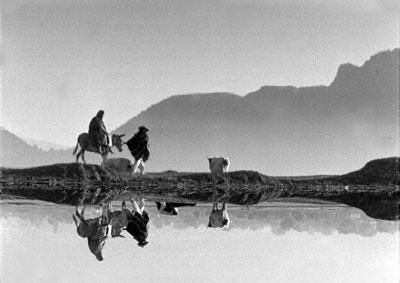Directed by Herbert Kline
Pan-American Films, Inc./Mayer-Burstyn, Inc. Producer: H. Kline. Screenwriter: John Steinbeck. Cinematographer: Alexander Hackensmid, With: Burgess Meredith (narrator). 35mm, b/w, 67 min.
John Steinbeck once remarked that most documentaries concerned large groups of people but that audiences could better identify with individuals. In his first work written for the screen and his only screen documentary (actually more of a docudrama told in the form of a parable), Steinbeck concentrates on one symbolic family. An indigenous couple, Ventura and Esperanza, live with their six children in the small and remote pueblo of Santiago, somewhere on the central plateau of Mexico. The film focuses on their oldest son, Juan Diego, who attempts to bridge two very different worlds, one traditional and one modern. Through an idealistic young teacher at the government school in his village, Juan Diego is introduced to modern science. As an outbreak of a mysterious disease begins to affect his family and the village around him, Juan Diego struggles to overcome ancient superstitions and tries to save his small community from suffering and death.
Steinbeck became involved in the project when friends introduced him to Herbert Kline, a distinguished young director who had recently directed four anti-fascist documentaries. Steinbeck wrote what he called an elastic story that could be stretched to fill the circumstances the film team found when they moved into a real back country village. The Forgotten Village was filmed in the states of Puebla and Tlaxcala, Mexico for $35,000, using a non-professional cast of mostly indigenous residents of the region. As none of the villagers could speak Spanish, much less English, a narrator was used to tell the story. Originally, Spencer Tracy was to do the narration, but, at the last moment, MGM reneged on releasing him from his contract. He was replaced by Burgess Meredith.
The film was to have had its world premiere on September 9, 1941 at the Belmont Theatre in New York City. In August, the New York State Board of Censors refused to license the film for public exhibition, objecting to a child birth scene that it characterized as “indecent” and “inhuman”. Luckily, the ban was overturned on appeal, and the film opened, uncensored, at the Belmont Theatre on November 18, 1941. It opened to good reviews and a modest box office, but, unfortunately, Pearl Harbor and the U.S. entry into the war diffused its impact.
Jeffrey Bickel
Preservation from the original 35mm nitrate picture and soundtrack negatives from the Stanford Theatre Foundation Collection and a 35mm nitrate fine grain master positive from MOMA. Laboratory services by The Stanford Theatre Film Laboratory, Film Technology Company, Inc., DJ Audio, Inc. and Audio Mechanics. Special thanks to: Mary Keene, Anne Mora.






 Mobile Navigation
Mobile Navigation

